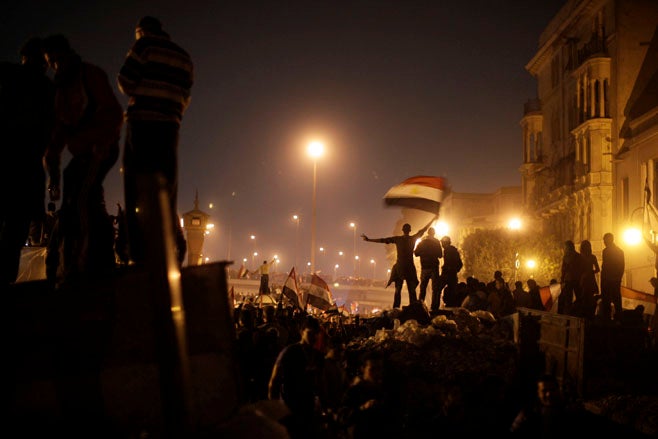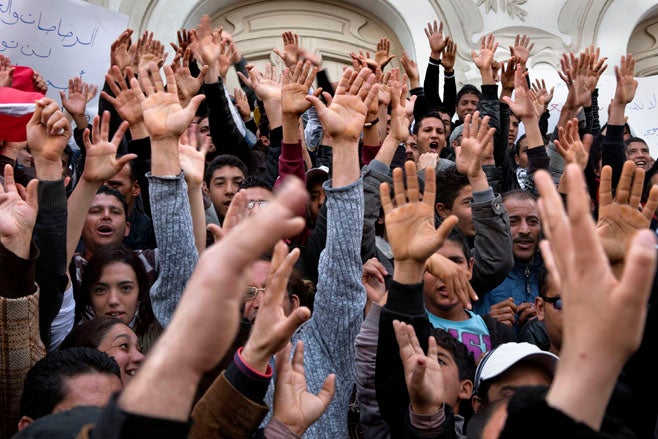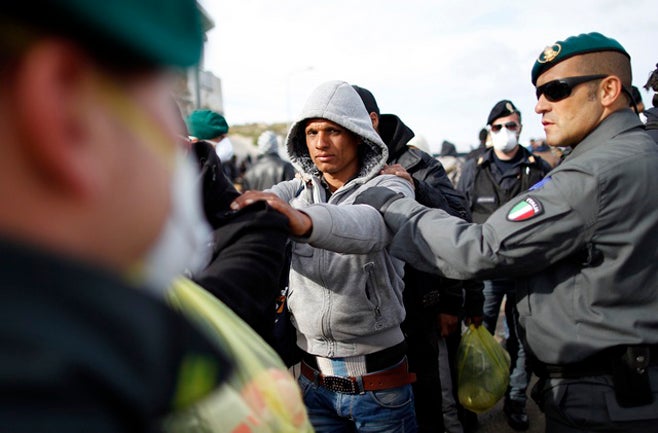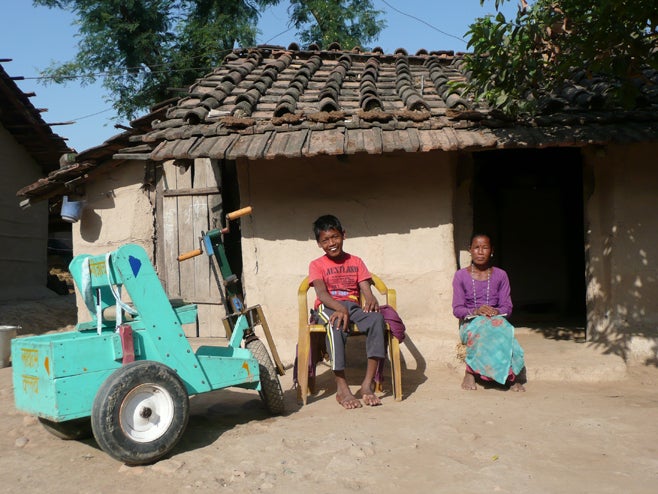Mexico has experienced a dramatic surge in homicides in recent years, driven in large part by the violent struggle between and within powerful criminal organizations to control the drug trade and other lucrative illicit businesses such as human trafficking. Efforts by the administration of President Felipe Calderón to combat organized crime have resulted in a significant increase in killings, torture, and other abuses by security forces, which only make the climate of lawlessness and fear worse in many parts of the country.
Journalists, human rights defenders, and migrants are targeted for attack by criminal groups and members of security forces, yet Mexico has failed to provide these vulnerable groups with protection or to adequately investigate the crimes against them.
Efforts to implement comprehensive reform of the criminal justice system, which would address endemic problems such as torture to extract confessions, continued to progress slowly in 2011, leaving in place a system rife with abuses.
Impunity for Military Abuses
President Calderón has relied heavily on the military to fight drug-related violence and organized crime. While engaging in law enforcement activities, the armed forces have committed serious human rights violations, including killings, torture, and enforced disappearances. Mexico's National Human Rights Commission has issued detailed reports of nearly 90 cases since 2007 in which it found that members of the army had committed serious human rights abuses, and it has received complaints of nearly 5,800 additional human rights violations from 2007 to October 2011.
In September 2011 Gustavo Acosta, 31, and his family awoke to the sound of shooting outside their house in Apodaca, Nuevo León. Several armed members of the navy banged on their front door and, when Acosta opened it, they demanded to know why the family had been shooting at them. When Acosta responded that they were unarmed, one of the navy officers shot him dead, according to his father and brother, who witnessed the shooting. At this writing no members of the navy had been charged in the crime.
One of the main reasons military abuses persist is because soldiers who commit human rights violations against civilians are almost never brought to justice. Such cases continue to be investigated and prosecuted under military jurisdiction, despite rulings by Mexico’s Supreme Court and the Inter-American Court of Human Rights that civilian prosecutors and courts should handle military abuses. The Military Prosecutor’s Office opened 3,671 investigations into human rights violations committed by the army against civilians from 2007 to June 2011. Only 15 soldiers were convicted during that period. An additional 14 army members were sentenced in a case in November 2011.
Criminal Justice System
The criminal justice system routinely fails to provide justice to victims of violent crimes and human rights violations. The causes of this failure are varied and include corruption, inadequate training and resources, and abusive policing practices without accountability.
Torture remains a serious problem and is most often applied in the period between when victims are arbitrarily detained and when they are handed to prosecutors, a period in which they are routinely held incommunicado. Common tactics include beatings, asphyxiation with plastic bags, waterboarding, electric shocks, and death threats.
One perpetuating factor is the acceptance by some judges of confessions obtained through torture and other ill-treatment, as well as the complicity of public defenders entrusted with safeguarding detainees’ rights. Another is the failure to investigate and prosecute most cases of torture, including the failure of authorities to insist that legally mandated medical tests, designed to assess the physical and psychological condition of a potential victim of torture, are adequately carried out.
In June 2008 Mexico passed a constitutional reform that creates the basis for an adversarial criminal justice system with oral trials, and contains measures that are critical for promoting greater respect for fundamental rights, such as including presumption of innocence in the Constitution. The government has until 2016 to implement the reform. At this writing only a handful of states have undertaken substantive changes.
In addition to its positive aspects, the reform also introduced the provision of arraigo, which allows prosecutors, with judicial authorization, to detain individuals suspected of participating in organized crime for up to 80 days before they are charged with a crime, a power that is inconsistent with Mexico's due process obligations under international law.
Freedom of Expression
Journalists, particularly those who have reported on drug trafficking or have been critical of security forces and authorities, have faced serious harassment and attacks. From 2000 to September 2011, 74 journalists were killed, including at least eight killed in 2011. While many attacks on the press in 2011 were attributed to organized crime, evidence points to the possible involvement of state officials in some instances.
Participants in social media networks have increasingly been the targets of violence and intimidation. In September 2011 three mutilated bodies were left in public places with notes warning against the use of social media networks, such as Twitter, to report on violence by organized crime groups.
Authorities have routinely failed to adequately investigate and prosecute crimes against members of the press or to protect journalists who face serious risk, fostering a climate of impunity and self-censorship. While Mexico broadened the mandate and autonomy of its special prosecutor for crimes against the press in 2010, the special prosecutor’s office has since failed to improve on its poor record of prosecuting cases. Similarly, while the Calderón administration created a protection mechanism for journalists in December 2010, it lacks clear functions and operating guidelines, and has until now failed to offer effective protection to journalists under threat.
Domestic Violence, Reproductive Rights, and Same-Sex Marriage
Mexican laws do not adequately protect women and girls against domestic violence and sexual abuse. Some provisions, including those that make the severity of punishments for some sexual offenses contingent on the "chastity" of the victim, contradict international standards. Women who have suffered human rights violations generally do not report them to authorities, while those who do report them are generally met with suspicion, apathy, and disrespect. Such underreporting undercuts pressure for necessary legal reforms and leads to impunity for violence against women and girls.
In August 2008 the Supreme Court affirmed the constitutionality of a Mexico City law that legalized abortion in the first 12 weeks of pregnancy. Since that time more than 15 of Mexico's 32 states have adopted reforms that recognize the right to life from the moment of conception. In September 2011 the Supreme Court upheld the state reforms as constitutional by a single vote. In May 2010 the Supreme Court ruled that all states must provide emergency contraception and access to abortion for rape victims. However, only five states have reformed their procedural codes accordingly and efforts to inform women and girls of their rights have been very limited.
In August 2010 the Supreme Court recognized the right of same-sex couples in Mexico City to adopt children and to marry, and ruled that all states in Mexico must recognize same-sex marriages that take place in Mexico City.
Labor Rights
Legitimate labor-organizing activity continues to be obstructed by agreements negotiated between management and pro-management unions. These agreements often fail to provide worker benefits beyond the minimums mandated by Mexican legislation. Workers who seek to form independent unions risk losing their jobs, as loopholes in labor laws and poor enforcement generally fail to protect them from retaliatory dismissals.
Migrants
Hundreds of thousands of migrants pass through Mexico each year and many are subjected to grave abuses en route, including physical and sexual assault, extortion, and theft. Approximately 18,000 migrants are kidnapped annually, often with the aim of extorting payments from their relatives in the United States. Authorities have not taken adequate steps to protect migrants, or to investigate and prosecute those who abuse them. Migration officials rarely inform migrants of their rights, such as the right to seek asylum, and the authorities themselves are often the perpetrators of abuses.
Human Rights Defenders
Human rights defenders continue to suffer harassment and attacks, sometimes directly at the hands of state officials. Meanwhile authorities consistently fail to provide defenders with adequate protection or investigate the crimes against them.
In February 2011 the homes of human rights defenders María Luisa García Andrade and Sara Salazar—both of whom worked with the organization Return our Daughters in Ciudad Juárez—were set ablaze in separate incidents. They followed a series of attacks and threats against these and other defenders, including the disappearance of two of Salazar's children and her daughter-in-law, who were later found dead. The Inter-American Commission on Human Rights had granted García and Salazar protection measures in June 2008, but federal and state authorities failed to take adequate steps to protect them. They later fled Ciudad Juárez with their families.
In July 2011 President Calderón signed an agreement pledging to create a mechanism to protect human rights defenders. However, at this writing it was unclear what progress, if any, had been made towards creating that mechanism.
Key International Actors
The US has allocated US$1.6 billion in aid to Mexico through the Merida Initiative, a multi-year aid package agreed upon in 2007 to help Mexico combat organized crime. Fifteen percent of select portions of the assistance can be disbursed only after the US secretary of state reports to the US Congress that the Mexican government is meeting four human rights requirements: ensuring that civilian prosecutors and judicial authorities investigate and prosecute federal police and military officials who violate basic rights, consulting regularly with Mexican civil society organizations on Merida Initiative implementation, enforcing the prohibition on use of testimony obtained through torture or other ill-treatment, and improving transparency and accountability of police forces.
However, the impact of these requirements has been undermined by the fact that the US has repeatedly allocated the conditioned funds despite evidence that Mexico has not met the requirements, most recently in September 2010. While the US State Department announced in September 2010 that it would withhold an additional $26 million in Merida aid for 2010, it pegged the funds to a different set of conditions, and then released the funds in 2011. In January 2011 US Secretary of State Hillary Clinton said that Mexico needed to “make sure that any human rights violations committed by the military against civilians are tried in civilian courts.”
In November 2009 the Inter-American Court ruled that Mexico was responsible for the 1974 enforced disappearance of Rosendo Radilla Pacheco, and had failed to adequately investigate the crime. The binding decision ordered Mexico to modify its Code of Military Justice to ensure that "under no circumstances can military jurisdiction be applied" in cases where the military violates the human rights of civilians.
In August 2010 the court found that members of the army had in 2002 raped and tortured Valentina Rosendo Cantú and Inés Fernández Ortega, indigenous women from Guerrero, and again ordered Mexico to modify its military code. The ruling was repeated in December 2010, when the court found Rodolfo Montiel and Teodoro Cabrera—peasant leaders from Guerrero state involved in environmental activism—had been arbitrarily detained and tortured by the military. Despite these four binding rulings, Mexico continues to judge soldiers who commit abuses in military jurisdiction.
The United Nations Working Group on Enforced or Involuntary Disappearances conducted a fact-finding mission to Mexico in March 2011. In its preliminary observations, it concluded that “enforced disappearances happened in the past and continue to happen in the present [in Mexico],” and that “the increased numbers of newly admitted cases in 2010 and the high number of new allegations received during the visit could indicate a deterioration regarding enforced disappearances in Mexico.” Among its recommendations, the group suggested Mexico create a national database of the disappeared, and end the practice of requiring victims’ families to gather evidence of the disappearance of relatives and possible participation of state officials before opening investigations.






